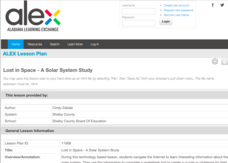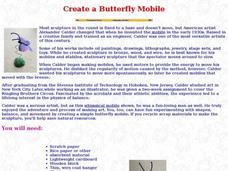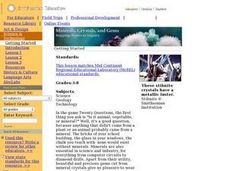Alabama Learning Exchange (ALEX)
Lost in Space - A Solar System Study
Fourth graders study the planets of our Solar System collecting data on a worksheet. They use online tools to create a puzzle or other digital product using the information from their research.
Curated OER
Measuring Animal Sizes (and Relative Sizes in our Animal Environment)
Students discover the actual size and weight of many insects and animals. In this biology lesson, students investigate animals and insects to determine their actual weight and size. In groups, students create an animal or insect of their...
Curated OER
Traveling the Planets!
Fourth graders research the planets and create brochures to share their information. For this planets lesson, 4th graders navigate the Internet to gather information for a brochure about an imaginary trip to their planet. Students...
Curated OER
Animals, Animals, Everywhere
Fourth graders participate in a variety of activities dealing with animal characteristics and classifications in this multi-task lesson. They use graphic organizers, make booklets, and make models.
Curated OER
"Four" Goodness Sake
Fourth graders recognize that ethnicity, religion and geography are reflected in the food choices we make. In this food choices activity, 4th graders discuss different types of food from different places. Students compare a menu to the...
Alabama Learning Exchange
The Birth of Rock(s) - Identifying Rock Types
Young scientists investigate types of rocks in this instructional activity. They collaborate to examine groups of rocks, make written descriptions of them, and use websites to help them identify the types of rocks they are.
Curated OER
Meet One Picky Bird
Students complete a research project For this endangered species lesson, students use the "Think, Puzzle, Explore" method to learn about endangered species. Students research and write a report on the red-cockaded woodpecker.
Curated OER
Weight A Minute
Students watch a video and engage in hands-on activities which introduce scientific information made real through re-cognition and understanding the phenomena of gravitational force and how it impacts life on our planet.
Curated OER
Ecosystems Connect
Students investigate ecosystems near their school and across the world. They examine both living (biotic) and non-living (abiotic) elements of each. They recognize ecosystems from various continents around the globe. The use of computers...
Curated OER
Create a Butterfly Mobile
Students construct a butterfly mobile. In this visual arts activity, students use rice paper, watercolors, a coat hanger, and wax paper to create a unique butterfly mobile. Students use photographs of butterflies to construct a realistic...
Curated OER
Readings in Hudson River Natural History: Understanding Informational Text
After reading a series of informational articles regarding the Hudson River Estuary, the class will answer a series of comprehension questions. An answer key is provided but the articles and worksheets are not.
Curated OER
Simple Machines - Inclined Plane
Students learn the fundamentals and daily applications of simple machines.
Curated OER
Simple Machines
Students engage in a lesson that explores the concept of simple machines. They view a powerpoint media presentation and then are introduced to adult volunteers for the lesson. Each volunteer is at a station with a simple machine and...
Curated OER
Look At Those Leaves!
Students observe, measure, and sort tree leaves. They examine leaves individually, in groups, and in relationship to the entire tree. Pupils take a walk outside for a "Leaf Walk." Students are each given a lunch size paper bag, so that...
Curated OER
Magnetic Discovery Bottle
Young scholars examine how to conduct simple investigations and use simple equipment to gather data. In this magnet lesson students decide what types of objects are attracted to magnets.
Curated OER
Find It!
Learners analyze the basic concept of Global Positioning Systems using triangulation and measurement on a small scale in the classroom. They describe a satellite and how it helps in locating a person on Earth. They explain how...
Curated OER
Observation Hike
Pupils participate in an observational hike to study the natural surroundings. In this observational hike lesson, students hike through a state park and observe the plant and animal life. Pupils learn about appropriate behaviors in...
Curated OER
Minerals, Crystals, and Gems
Students discover the relationships between minerals, crystals and gems. They bring in rocks that they find at home, in the schoolyard, etc. and examine them and attempt to identify them. They set up a classroom exhibit that includes all...
Curated OER
Harvesting Oil from the Earth
Fourth graders research sources of fossil fuels especially oil while determining how scientists take core samples from an Earth model. They look at oil consumption and production in the US and throughout the world.
Curated OER
Strawkets and Thrust
Students investigate the effect of thrust on rocket flight. They construct two paper rockets, one with a smaller exit nozzle, and compare/contrast the distances traveled by the rockets.
Curated OER
Fuel Mystery Dis-Solved
Learners describe how temperature and surface area exposure affect the rate at which fuel is consumed. They explain why engineers want to know about the properties of a fuel when designing rockets. They create a bar graph of result data.
Curated OER
Strawkets and Control
Young scholars investigate the effect that fins have on rocket flight. They construct two paper rockets that they can launch by blowing through a straw, one with fins and one with wings, and observe and record the results of the rocket...
Curated OER
How Long Does Trash Last
Students work in cooperative groups to estimate how long trash lasts in a landfill. They study environmental consequences of not recycling and use graph-making software to create a graph that illustrates the lifespan of trash items...

























